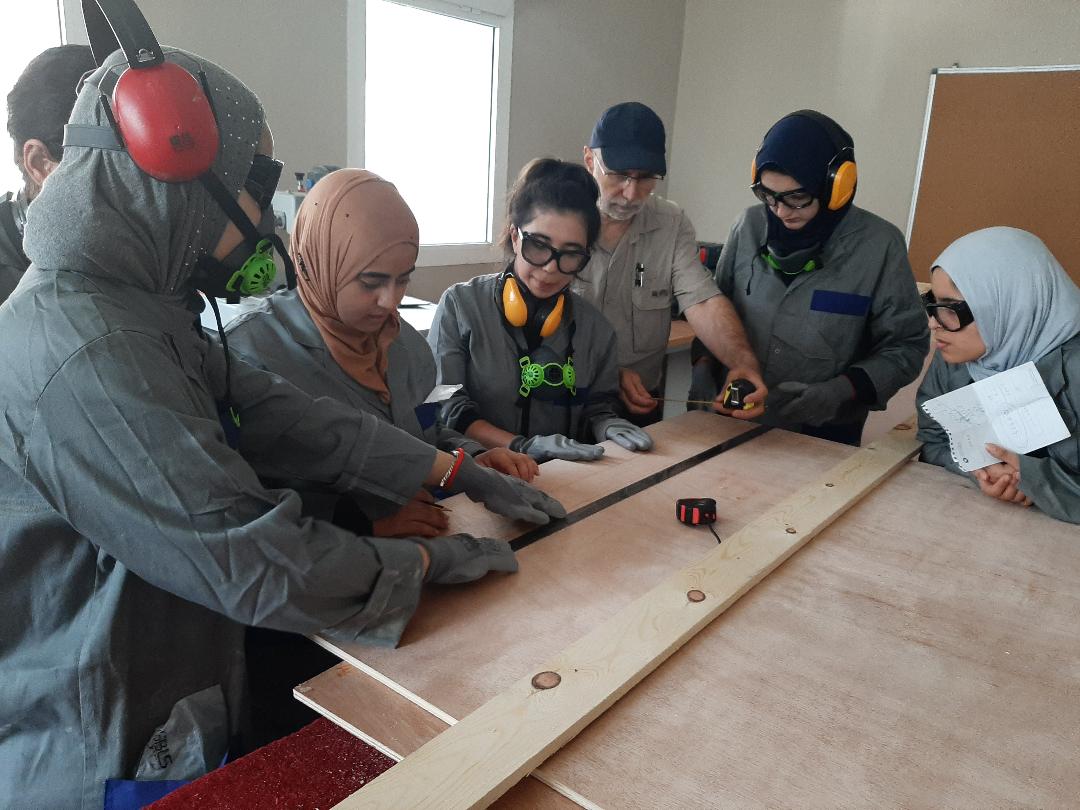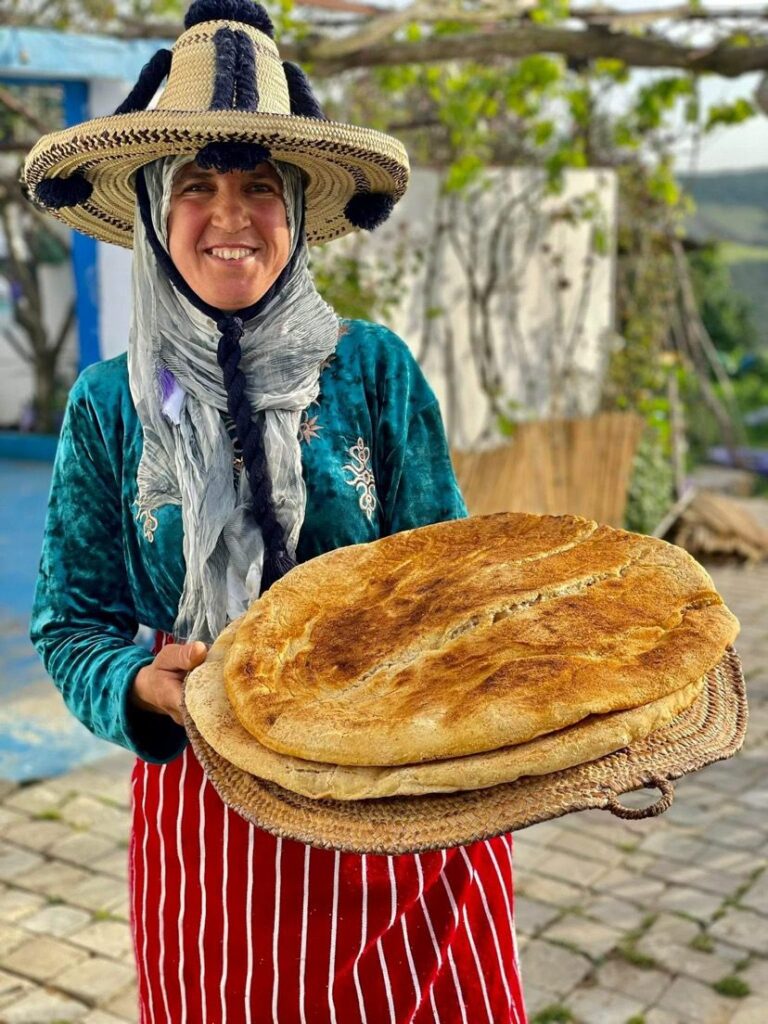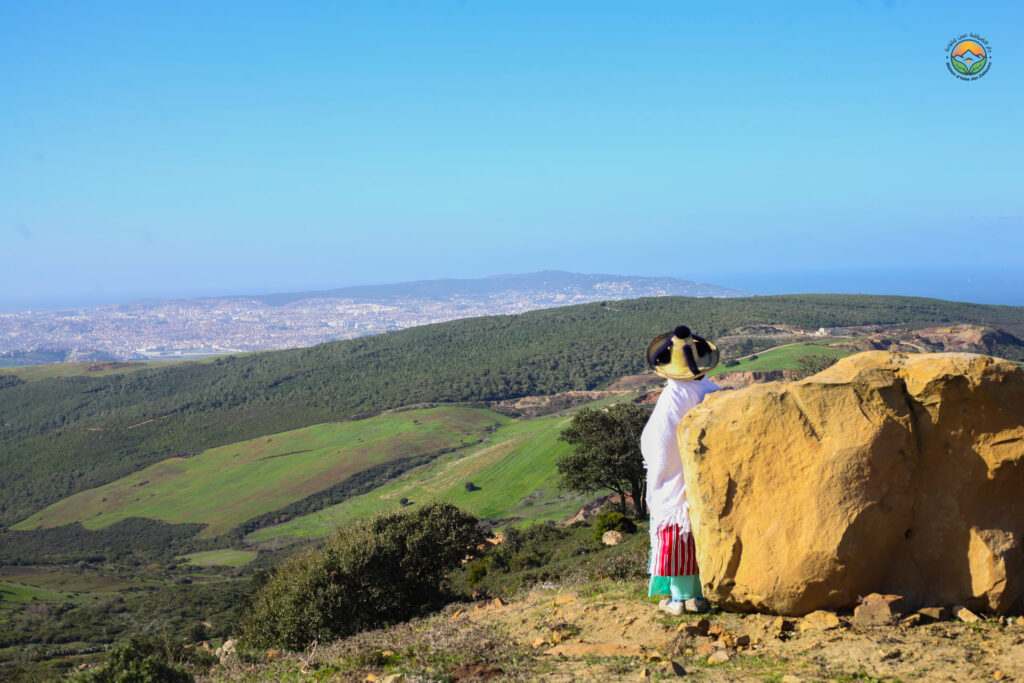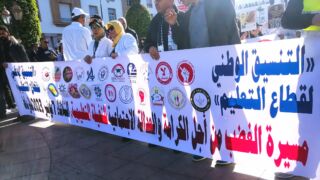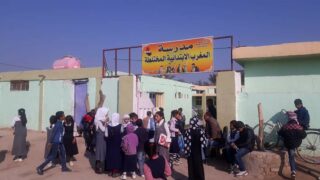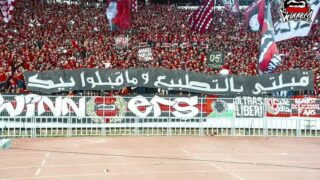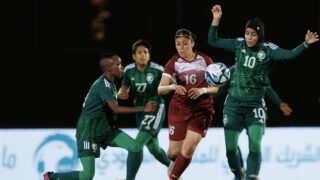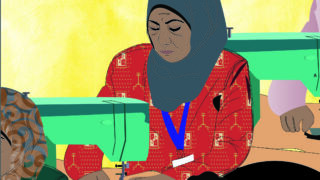
This publication has benefited from the support of the Rosa Luxemburg Foundation. This text may be reproduced in part or in full, provided the source is acknowledged.
Just as light comes out of the darkness, so do many women draw light out of the gloominess of life. They chose not to wait for the state or society to help them. Instead, they have strived with all their might to bring about a radical change in their lives and in the environment in which they live. The sense of initiative possessed by many women has always played a leading role in women's ability to change their destinies and the fate of those around them, if only by having a source of income that would protect them from the many ups and downs of life and free them from the constraints of need and dependence.
Here are some of those initiatives that aim to improve the lives of a large group of women, especially those who do not have a good education, reside in remote areas, or do not have the capital that allows them to own their own projects.
Initiatives, individual or collective, are rooted through cooperatives or foundations aimed at helping women overcome poverty. The impact can be felt by meeting those pioneer women and seeing their faces brim with hope instead of the usual somberness caused by poverty, if not violence.
Many women have been resisting circumstances and harsh realities by carrying the fiery ember of hope wherever and whenever they go, whether by searching for solutions to intractable problems or creating projects from scratch. By recycling unproductive materials or taking advantage of present opportunities and available agricultural products, these women produce oils and convert grains into ready-made meals, such as couscous and the like. Also, they present and clean medicinal or cooking herbs in a way intended for immediate consumption. Moreover, they work in some branches of traditional industry, sewing, making sweets, and even making cheese by raising goats and cows. Women have tipped the balance in their favor, sometimes by engaging in simple and inexpensive crafts, which rescue entire groups and families from poverty.
Alternative energy and the sun of ambition that never sets
Many women depend on their work in cooperatives to overcome poverty and provide for their needs, as financial independence gives women more respect within traditional families. Productive cooperatives have been game changers when it comes to women’s conditions in Morocco, especially for those women who did not get the chance to receive a good education and sufficient training and who are in dire need of work. With time, productive cooperatives were no longer limited to work in agricultural products, which have astonishingly boomed thanks to the spread of thousands of cooperatives. Women’s efforts have expanded to another field; that of alternative energy, with the help of ambitious young women who manufacture devices that run on solar energy instead of electricity. Such initiatives take place not only in the cities, but in the rural areas as well, where women can benefit from this technology which does not require the either lacking or unaffordable electric power.
“Diaa for Solar Solutions” is a feminist cooperative which has been putting forth and developing this idea. The cooperative was established in 2019 in Fahs-Anjra, a rural province located about 25 kilometers from Tangier, by 14 young women with various expertise. They intensified efforts to combine their abilities in a cooperative that manufactures, installs, and markets solar-powered devices. These devices are used for converting materials of agricultural origin into various foodstuff or beauty products such as Argan oil, roasting and grinding grains, and facilitating numerous industries related to the field.
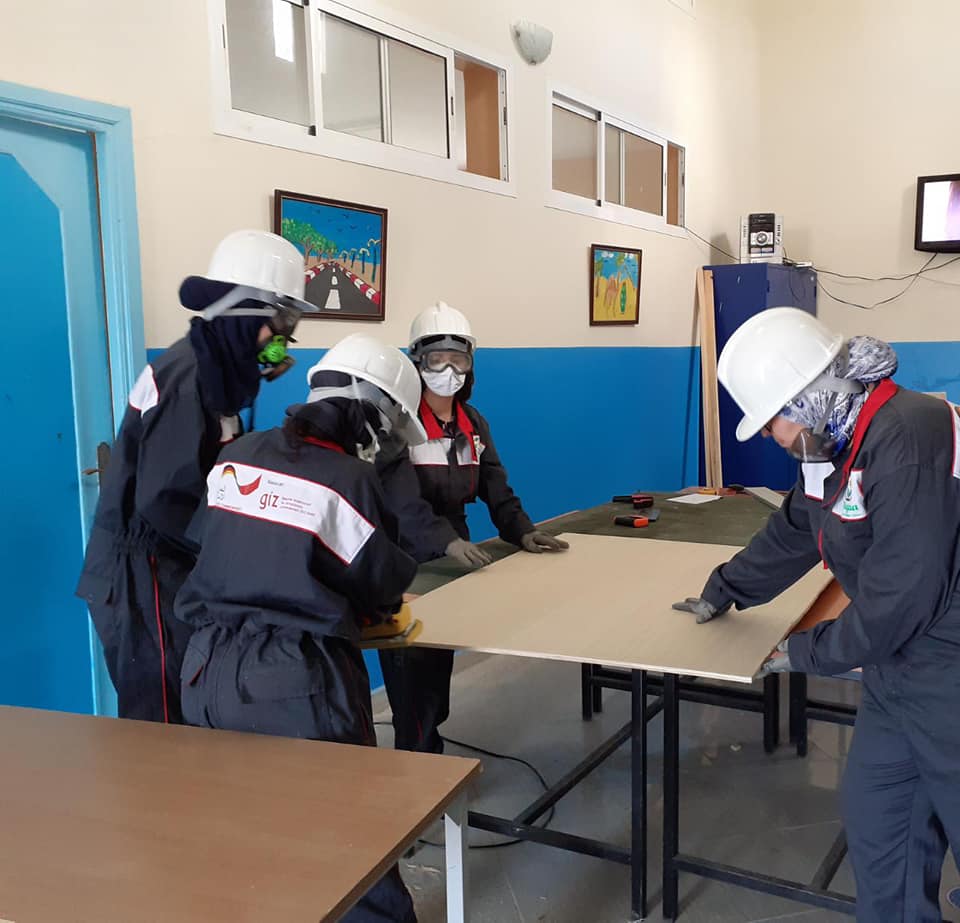
The cooperative makes appliances that work without electricity, butane gas, and wood-burning; all of which are energy sources that harm the environment and are costlier for any cottage industry that women might run. The initiative began with Asia Al-Sibai, a young woman with a vibrant smile and a twinkle of enthusiasm in her eyes. Since graduating from the Faculty of Law, Asia has been working on pioneering projects and participating in continuous training and endless meetings about the changing industry. Speaking to Assafir Al-Arabi about the purpose of establishing the cooperative, Asia Al-Sibai said: “The cooperative aims to create job opportunities for young women in green professions, preserve the environment, and create a field of innovation and development for young women with college degrees under the age of thirty.”
Member of the cooperative hold degrees in a variety of specializations to cover all fields related to work, including energy engineering, vocational training, law, and so on. Regarding the workplace, Asia said: “We chose Al-Badiyah to set up a workshop in the field of scientific technology, given that this rural area provided vast spaces that allow the cooperative to conduct experiments and complete every stage of the industry.” She added: "As it raises the awareness in villages about the importance of preserving the environment and using alternative products to traditional methods," the cooperative "will work on improving the quality of their organic products by preserving the color, taste, and nutritional value." The manufacturing, installation, and raw materials used to construct these ovens have all proven their ability to preserve the quality, taste, and nutritional value of cooked foods, be they vegetables, meats, or bread.
With her backpack as her everyday companion, Asia is a practical woman who does not let anything get in the way of changing what can be changed. In her opinion, “Every young woman in the cooperative is motivated by a specific field of alternative energy, in addition to their desire to search for alternative solutions for cooperatives and tiny enterprises, especially with the state threatening to lift gas subsidies in the future. If that happens, it would lead to higher production costs and prices, which will adversely affect the demand for products and harm the women working in the agricultural cooperatives." As for the profits, the cooperative divides them equally among all the working young women.
So far, the cooperative has succeeded in manufacturing a solar-powered cooking oven and an agricultural dehydrator. The cooperative was able to market both cost-reducing devices to other cooperatives working in agricultural-based materials such as those producing Argan oil and medicinal and aromatic plants. The cooperative also seeks to develop its products to include other devices closely related to women's economic life. Moreover, these ovens have made it easier for the village women to perform other tasks, relieving them of the task of observing the stages of food cooking by setting different timers for various food separately.
The lack of proper training for those involved in the field of solar energy solutions remained an obstacle in the path of the cooperative. That is because the required technical training is only available outside Morocco, and the cooperative does not have sufficient funding to train cooperative members outside the borders. It also did not receive a large part of the funding granted to it by foreign and national bodies. After years of receiving financial support from the German Development Agency (GIZ), bureaucratic procedures have so far hampered access to the funding. Moreover, they had difficulty persuading customers to abandon gas and use sunlight as alternative energy. That is in addition to the strong effects of the COVID-19 pandemic on the functioning of all economic projects.
The initiators participated in the National Prize of “Lalla Al Moutaaouina” for the best idea and won. They signed a partnership contract with the state-owned company Office Chérifien des Phosphates (OCP), which presented the award. They also received training by Cooplab, a laboratory that supports cooperatives, which the OCP launched in partnership with Mohammed VI Polytechnic University. The mission of this laboratory is to provide training based on the principle of learning by doing to foster a culture of innovation and keep pace with cooperatives.
Nadia, the ever-shining candle in the face of the wind
With a timid yet cheerful smile, Nadia welcomed me into her humble house in a mountainous area overlooking the sea. I preferred to tour the garden and the hospitality facilities. Given the rainy weather, some pieces of furniture have been brought in, in anticipation of the summer in which Nadia's clients like to sit in the outdoor lounge to enjoy the breeze from the sea. However, they now content themselves with sitting indoors.
She is a young, slim woman who radiates warmth and tenderness, but she also strikes her visitor with an air of seriousness, hard work, and perfectionism which show in her voice, body movement, and language. Her wit is overwhelming, even though she never went to school. Nadia appeared for the first time in several videos posted by local media websites and guests who called for her support and invited others to visit her guest house.
Nadia told Assafir Al-Arabi her story, which began when her husband fell ill, which threatened the livelihood of her five children. The idea of the guest house is to provide fresh air, nature, tranquility, and traditional organic food to visitors. She furnished her house with raw materials such as tires and colorful mountain napkins on small tables of various shapes. Such pieces of furniture we usually find in village homes. She painted the walls of the small café with lime. It is a custom usually observed by women in the area, where houses are painted annually on holidays to restore the purity of the white, blue, and sometimes creamy colors.
On those tables, Nadia sets a special breakfast for her guests. She serves local cheese and butter; Malawi, Ragaif, Harcha, and Baghrir pies; pan bread cooked in a traditional oven, smelling of burnt wood; fried eggs; olives seasoned with coriander, parsley, garlic, thyme, and cumin in the Moroccan olive marinade. To run the guest house, Nadia established the Ain Zaytouna cooperative to produce foodstuffs that the guest house serves, such as pastries and so on. The women of the cooperative usually make these meals because Nadia cannot alone provide for the guests' needs during the high season. She sometimes juggles many roles herself: she’s a hostess, cook, and waitress.
Nadia is considering developing her guest house to provide accommodation for her guests who want to spend a night outside the city and far from the noise, but she currently lacks the means. She spares no effort in spreading her initiative. In many of the videos in which she promotes the place, she advises women in similar circumstances to fight to provide for their families with whatever is available. Nadia does not want her initiative to stop there. In fact, she wants her message to reach many women who live in the desert and do not have many resources. She asked women to dedicate part of their houses to hosting mountain hikers and providing breakfast and lunch with local products that give the guests the experience of living in the desert, even if for a few hours. That is especially useful in the villages that lie between the mountains and forests, where nature has astonishing beauty and charm. A local oven, hot tea, and a few chairs are sufficient to provide a livelihood for the people in the area and make a life experience worth living.
Education has no age limit
Regardless of the names, whether Fatimah, Layla, Saeeda, or Hanan, the achievement is the same. Women have triumphed over social conditions and regained their right to getting an education, whatever the stage they had left school at. Even if they did not attend school at all, women could obtain a certificate after successfully passing the exams set annually by the Ministry of Education in Morocco for all levels. However, the Moroccan Ministry of Education has failed to set up an educational system that provides the lessons stipulated in the regular curriculum to older women, making the dream of passing these exams very difficult for those who wish to graduate.
Umm Maryam has tried to fill that particular gap by establishing a private tutorial center. It was a rare effort that has benefited hundreds of women who have received lessons at her center and succeeded in obtaining a BA or MA. Some of them worked in the center to return the favor and give others the same opportunity they had. They have also provided an education and regular classes that developed awareness and confidence and facilitated finding work for many women who previously had no place inside the formal educational system and the stable employment opportunities.
Umm Maryam explained: "The idea of providing regular lessons began in August 2012. After we established an association for memorizing and reciting the Quran, we thought it would be nice to further expand the circle. Each period we added a specific activity. We chose to adopt the idea of adding free education within our activities to place girls onto the educational tracks, help them find their own path in society, and keep pace with the era in which education has become a cornerstone. The idea evolved over time. At first, we were preparing young women to pass primary, middle, and high schools, and now we have reached university education."
She added: "We adopt a study system that tracks what is being done at schools at a given moment. The course is usually two or three days per week, and then the classes are distributed to the female teachers. The number of beneficiaries in each academic stage ranges between five and fifteen women."
For attending all the lessons, the beneficiaries pay a symbolic amount that hardly covers the salary paid for a single teacher. Umm Maryam regrets that such financial difficulties exist and make it difficult for the association to cover the costs of this effort. Her only consolation is that “the work continues and is achieving significant success.” Umm Maryam performs administrative and teaching tasks within the association, which despite its limited resources, has teaching departments and other departments for professional and charitable works. The association provides social services to the needy. It also provides health, psychological, and social counseling for family issues and marital problems.
Umm Maryam avoids media appearances and prefers to remain anonymous. Why? "I feel comfortable in my work in this way, and I prefer to work away from the spotlight so that I can perform my duties with the same sincerity," she said. Concerning the future prospects of the association, Umm Maryam said: “We aspire to cover all the costs incurred by the association from a free source owned by it.” “We do not want anything else” to go further in the effort to rebuild a key but uneducated part of society, which is the light at the end of the tunnel.
Black beauty
They are women who just so happen to have a skin color that is “different from the majority”. However, society's view of their “difference” is neither fair nor logical, but a racist view which underestimates them just because they are black. However, the young black women of Morocco have decided to bravely confront racism, as an act of cultural and social exclusion, with multiple initiatives on social media platforms.
Model and photographer Huda Fono has created an Instagram page called “Bilarabi Black Women” (or Black Women in Arabic). In an interview with Assafir Al-Arabi, she explains: “It is an initiative that started almost a year ago. It aimed to break stereotypes of black women in North Africa and the Middle East. I have discussed a range of everyday racist expressions on the page. I also made several photo shoots of black women with various themes to help the women feel comfortable, beautiful, and confident in their hair and skin. The photographs have helped them face the adverse effects of the offensive phrases they keep hearing; whether those saying those words have bad intentions or not, their words have devastating effects."
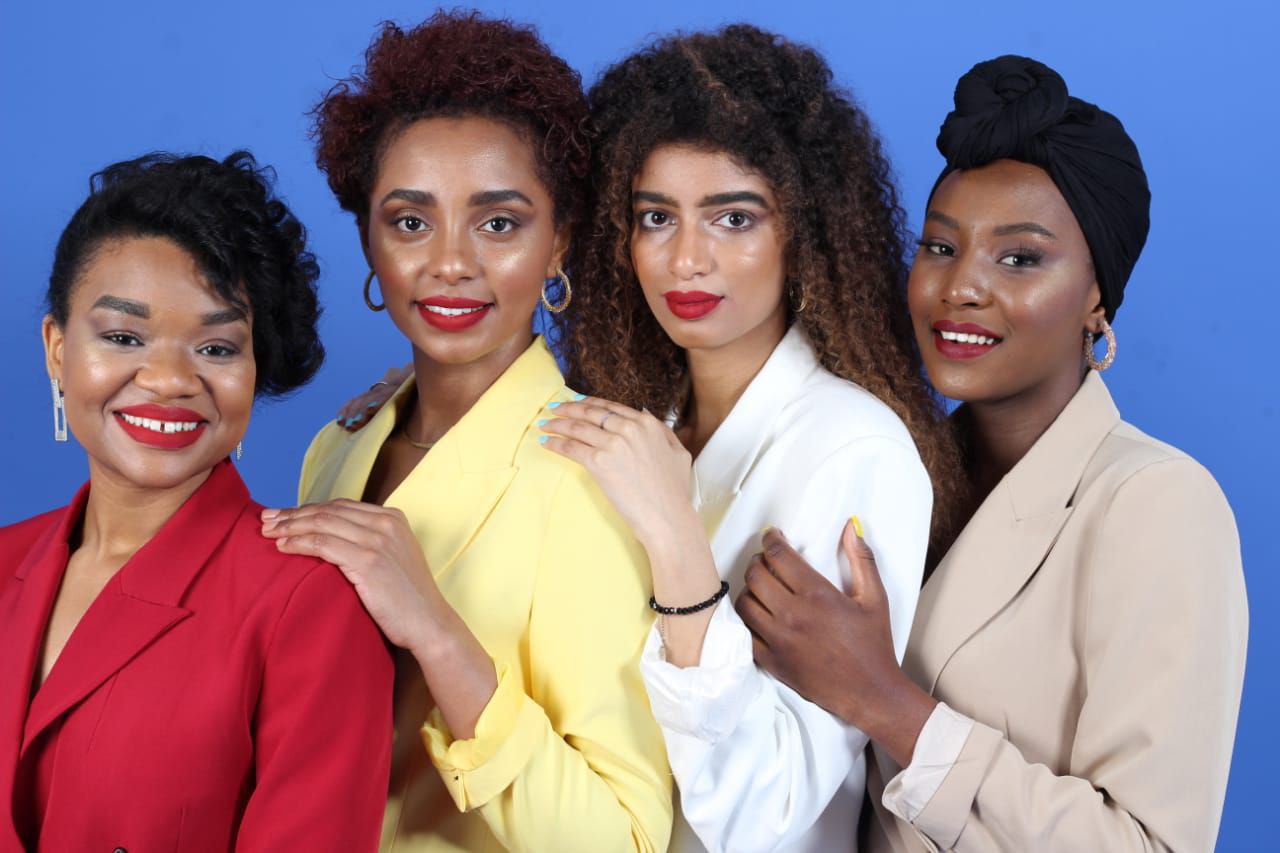
Huda added: "Through sharing my personal experience with others, I hope my initiative can address women of all generations, especially since many similar experiences reach me in private messages. That is why I aspire to be influential in a positive and motivating way for women in various fields based on my field of interest." What this initiative is doing changes the general perception of beauty standards through pushing the idea that differences in appearance must be accepted, as this is primarily a matter of values and culture. The initiative seeks to end the exclusion of black people from popular beauty standards, which deprives black women of employment opportunities and, even, poses an obstacle for potential marriages due to some families’ racist objection to black brides.
The initiative hopes to succeed in changing the prevalent ideas that see pure whiteness as a standard of beauty and sophistication, so that society can see black women for the distinguished persons they are without underestimating them. Only then can black women find a place for themselves in public spheres, the media, corporate offices, and even in the families that once considered blackness to be synonymous with “ugliness, poverty, and deprivation”.
The content of this publication is the sole responsibility of Assafir Al-Arabi and Rosa Luxemburg Foundation cannot accept any liability for it.
Translated from Arabic by Sabry Zaki
Published in Assafir Al-Arabi on 01/05/2022

